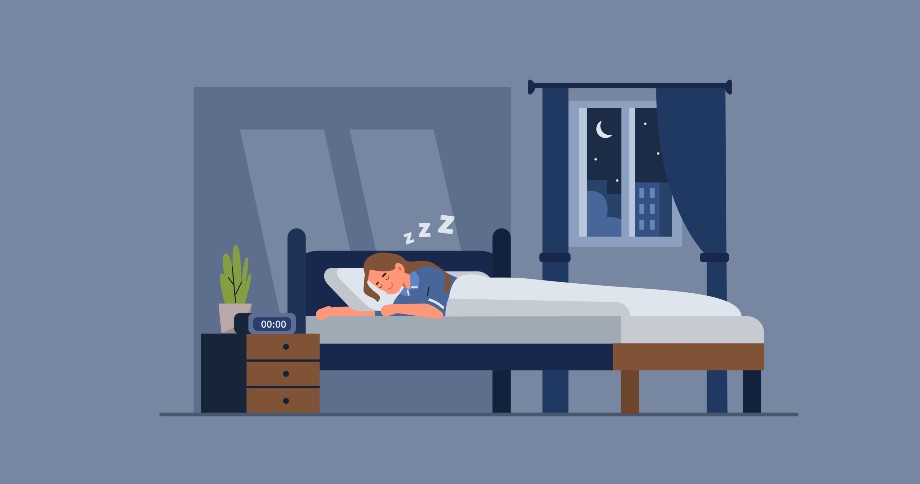Our bodies are wonderfully designed for life. Unfortunately, the life they were designed for no longer exists! When we evolved thousands of years ago, the world was a very different place. An apple was just a fruit and time was measured simply by the moon, the sun and the changing seasons.
The rate and pace of change over the past 30 years alone has been incredible and, with it, our ability to relax and simply ‘switch off’ has been significantly impacted.
- Did you know? 36% of UK adults struggle to get to sleep on a weekly basis, 1 in 5 have trouble falling asleep every night and nearly half of people in the UK have trouble falling asleep at least once a month (1)
- Research suggests that women have more difficulty falling asleep than men and that people aged 45-54 struggle the most when trying to fall asleep (1)
- In a Mental Health Foundation survey, 48% of adults and 66% of teenagers agreed that sleeping badly has a negative effect on their mental health (2)
The human body has all the processes it needs to rest and recover, physically and psychologically – sleep! It produces its own sleep inducer (melatonin), it possesses the hormones it needs to repair itself and it has developed a natural rhythm which helps it to work in harmony with nature and natural light levels (circadian rhythm). The only problem is we’ve developed habits that actually work against our body’s sleep processes! So what can we do to work with our body?
Get outside during the day
We need natural light to stimulate the production of melatonin so getting outside in the morning and during the day helps the body to produce the right amount to trigger our sleep process in the evening.
Fresh air and exercise (even light exercise) all help the body to work as it’s meant to – the more physically tired you are the more your body needs sleep.
Listen to your body
Before we had watches or clocks, our bodies knew when they needed to sleep. Have you ever been sat on the sofa and suddenly felt sleepy? But hang on it’s only 9:30 pm, you can’t go to bed yet – why not watch another two episodes of your favourite Netflix series? Answer, because your body has just told you it’s ready for sleep! If you ignore it and all the associated triggers, you may well struggle to go to sleep when you finally choose to head to bed.
Our bodies are clever. Listen to what yours is telling you and you may begin to have a better relationship with sleep!
Keep a sleep diary
If you are struggling with your sleep, then make a note of all things sleep related and try to look for patterns or triggers. Some things to consider include sleep duration, worries and stress, and food and drink intake.
Create a better sleep environment
Temperature – a standard room temperature is 18-21 degrees celsius but the ideal temperature for sleep is between 15 and 18 degrees celsius, so turn down the thermostat (you might even save a bit of money!)
Minimise light when you sleep – make your bedroom as dark as possible. Consider black out curtains or even an eye mask
Oxygen – sleeping with windows and doors closed can lead to less oxygen in the room. Open the window or door slightly to allow more air to circulate
Declutter – a cluttered room can seem like staring at a ‘to do’ list. Get rid of any distracting clutter and create a sleep space you can relax in
Separate stress from sleep
Being stressed can impact your ability to fall asleep and your body’s ability to fully rest and recover. Your stress hormone, cortisol, will suppress the release of melatonin as it thinks you are in danger and wants you to be alert. It also impacts the body’s ability to release growth hormones when you are asleep, which in turn means you may not be able to fully repair your body as needed.
If you’re feeling stressed in the evening, why not try some simple relaxation and/or breathing techniques and try to have a set sleep routine (a set bedtime, a warm shower or bath before bed) to dial down your stress levels.
This blog is taken from Sovereign Health Care’s latest employee health and wellbeing topic, ‘Sleep – get good rest to be at your best’. The topic is available, free of charge, to all Sovereign Health Care’s corporate customers and their employees via the Sovereign Resource Hub. This online information centre is designed to support businesses’ health and wellbeing programmes by focusing on a new topic each quarter. It’s there to help organisations raise awareness of and improve employee health and wellbeing. It’s FREE to use and provides activities and materials to help employees make simple lifestyle changes that could lead to big improvements at home and at work.
Sovereign Health Care’s straightforward health and wellbeing solutions are quick and easy to implement in your business. Let us help you get started. Talk to us today! Find out more here https://www.sovereignhealthcare.co.uk/business/
Sources: (1) Formulate Health Insomnia Statistics UK 2021, (2) Taking Sleep Seriously: Sleep and our Mental Health (UK) report (Oct 2020)
